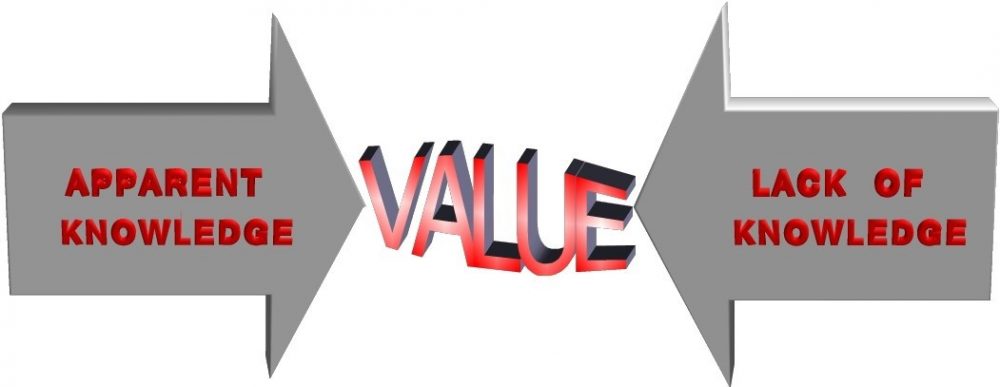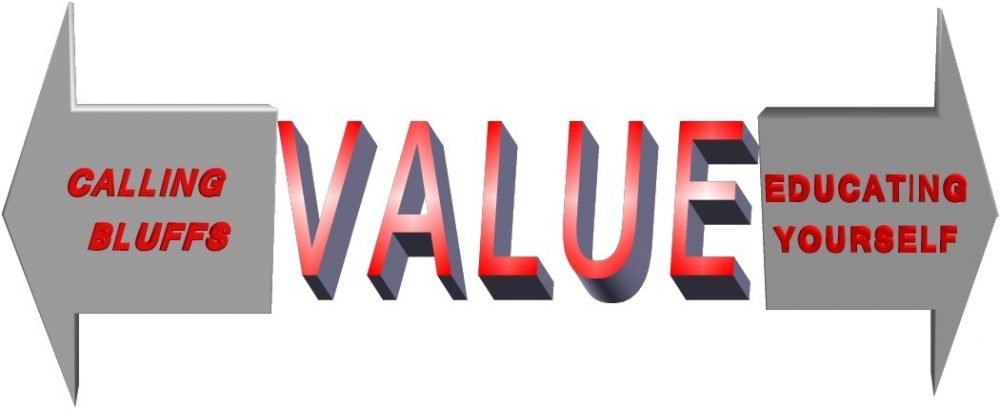Never having seen the show, a co-worker was describing the premise of Pawn Stars. Personally, there’s always been something sketchy about pawn shops since the operations seem like barely legal fences. Anyway, that’s neither here nor there, so back to the show…
Some poor sucker walks in wanting to sell whatever item they’re trying to rid themselves of. First thing the owner asks is what they think the item’s worth. Once the owner knows that number, the game begins.
Apparently the replies range from the colorful to the mundane, but they all convey the same message – “there’s NO way it’s worth THAT!” Even if the owner hasn’t a clue as to the real value, they’ll become temporary experts to close the deal.
Of course, after they’ve secured the item, the next part’s easy. Turn around, jack up the price, and look for sucker #2. Again, even without the necessary knowledge, the owner can convince any customer that what they’re considering is a great deal and MUCH cheaper than the original purchase price. Don’t forget the original price is different from their purchase price ;)
The profits made from this type of transaction are also the premise of arbitrage. To purchase an item for Cost -1 than sell the same item, without changing its inherent value, for Cost +1.
A little bit ago, I wrote about the importance of earning more AND cutting expenses in order to maximize your savings. I don’t subscribe to the idea that there’s one single solution because your personal finances are a holistic system that requires tweaking from all angles. It doesn’t matter how much water you put in the bucket if the bottom’s riddled with holes!
Well, since purchasing is the opposite of saving, I decided it was important to focus a new post on MAXIMIZING VALUE.
Anyone ever play the game bullshit? Tell each other your cards, then guess the bluffs.
We play it often in real life too, and unfortunately, we’re losing out more often than not. Like I discussed with outsourcing, some things are best left to the experts, but that doesn’t mean to check your brain at the door. And herein lies the importance of education, one of the foundations for Engineer Your Finances.
With any transaction, there’s a provider/seller and user/buyer. Both parties want to maximize the return on their investment. Too often, we see scenes of the provider/seller squashing the value, and increasing their own return, by capitalizing on the user/buyer’s lack of knowledge and aggrandizing their “apparent” knowledge. Case in point – Pawn Stars (although the roles are opposite in the above description). Or think of the helpless, broken-down driver at the mercy of a repair shop.
“I have no idea WHAT’S wrong, but SOMETHING is – please fix it!”
[Insert greasy mechanic wiping off hands and grinning ear to ear]
“No problem friend, I think I can help you”

Being very visual, I created graphics to help illustrate these points (nerd alert). Figure 1 above will be the diagram for “Value: Seller’s Advantage”. As you can see, the seller weakens the buyer’s value by coupling the seller’s lack of knowledge with an increase in their apparent knowledge (real or not).
The thing that perplexes me is when people are aware of these situations, yet they fail to act and change the transaction to their favor. Relating back to the Pawn Star example, wouldn’t it have made sense for the sellers to research the items before walking in? Having some sort of baseline, even if it’s slightly outdated, a little too wide of a range, or not specific to your exact item – it’s still better than nothing!
Alright, so now that we’re all excited…how do we combat this?
The boring part requires you take the time to educate yourself on whatever it is. Car making funny sounds? Simply searching “car noise + [insert onomatopoeia-like words]” will give you at least a general idea as to the problem. The more you learn about the topic, the more confident you’ll become in your own abilities and the easier it will be to recognize someone’s falsifications. And knowledge is the first step that leads to financial independence.
The fun part comes in calling someone on their bluffs! Listening to someone go on and on about how this or that, then coolly replying – BULLSHIT! Demonstrating any level of knowledge will require the seller to back down, proceed less aggressively, and carefully choose their words. This momentary “mental stun” gives you, the buyer, a huge advantage. Much like in boxing, martial arts, or any other combative sport – now’s your time to strike!

The end result is illustrated in Figure 2 below, “Value: Buyer’s Advantage”. While You may not receive the true value/cost of the item, but understanding what exactly you are buying and what is involved with it, you will significantly stretch the value of the item in your favor and more likely receive the best possible price.
The interesting thing about both these conditions is that the outcome is really only dependent on ONE factor – EDUCATION. Having it will get you out ahead, lacking it will get you hosed. The greatest benefit of understanding this and implementing it is that does not just apply to personal finance, but all facets of life.
Being able to call someone on their bluff can be a very thrilling and empowering moment. Has this ever happened to you? How did the game change after? Did you get anything more from the transaction?
